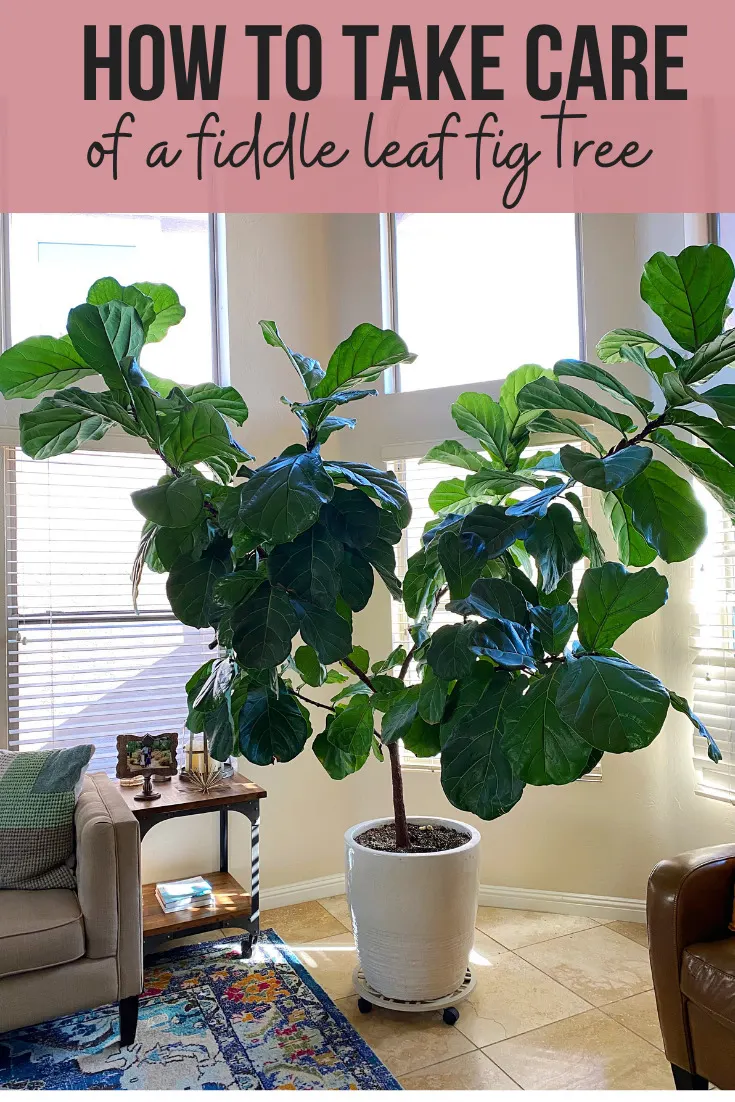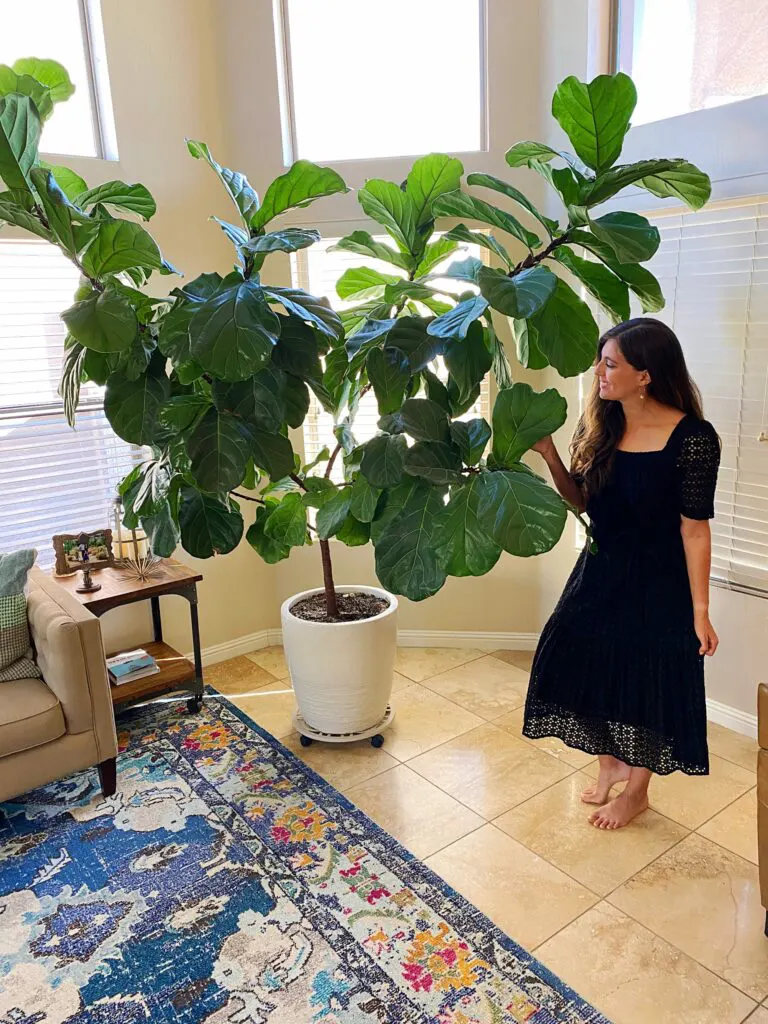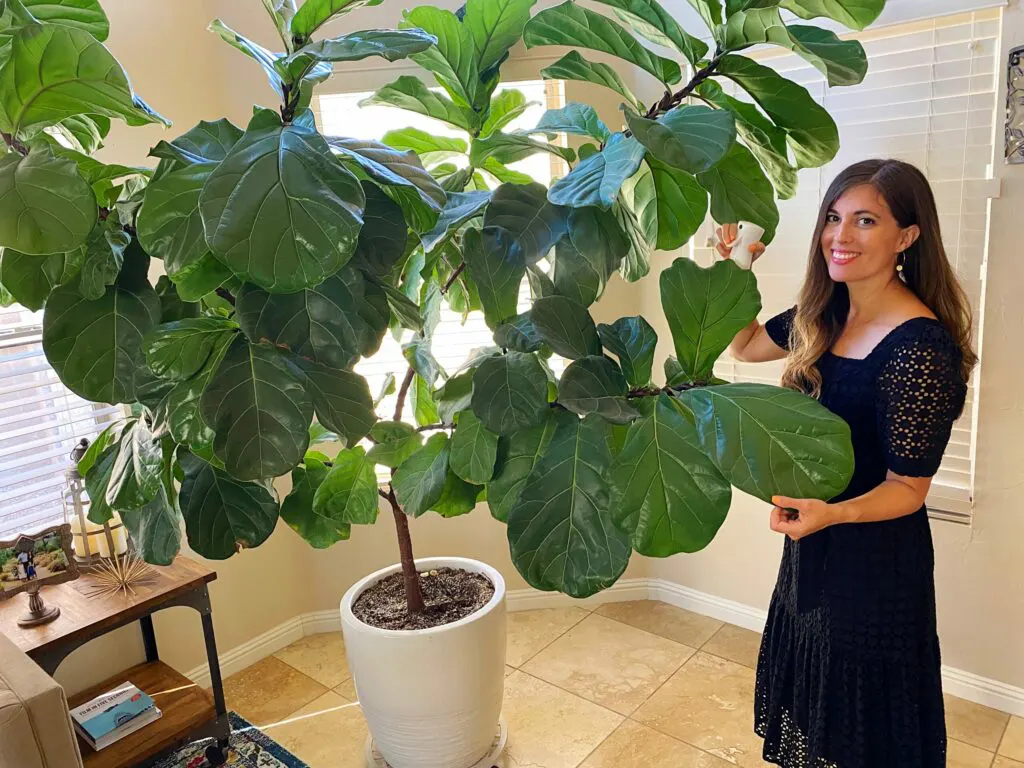Sharing tips on how to take care of a fiddle leaf fig tree, how often to water it, how much water, how much sunlight, all of those important questions!
Meet Frida Kahlo. She’s our gorgeous fiddle leaf fig plant that greets everyone who walks into our home.
Frida receives SO many compliments both in real life and online, and I often get questions about how to take care of these tips for plants.
I hesitated to write this post because I used to be a notorious plant killer. Over the past handful of years, I’ve FINALLY found my groove, and while I feel pretty confident about my routine, I’m still scared to jinx anything.
I can’t help but fear that as SOON as I publish this post, Frida’s leaves start to recoil and burst into flames. But I’m going to go for it.
I hope you find some helpful tips here and my fellow fiddle leaf lovers, please share your top tips in the comments.
What Is A Fiddle Leaf Fig Tree
A fiddle leaf fig plant is also called a Ficus lyrata. They are tropical trees that do extremely well outdoors in moderate and humid environments.
Over the past 10 years or so, they’ve surged in popularity. Fiddle leaf figs commonly grace magazine covers, Instagram, and Pinterest posts.
It is a beautiful houseplant that can add to the aesthetic appeal of your space and can be a stunning, architectural statement in your home. It makes a decor impact and is also notorious for being a challenging houseplant to keep alive.
In this post, I’m sharing tried and tested tips on how to take care of a fiddle-leaf fig tree, find time to repot it, and keep it looking lush, healthy, and thriving for a long time.
How To Take Care Of A Fiddle Leaf Fig Tree
Proper Placement and Lighting Requirements
The key with fiddle leaf figs, tropical plants, and house plants is to find a place in your home where they’ll be happy. Usually, this is a north or south-facing window, where it can get lots of sunlight. These plants also tend to do well in areas with high ceilings, skylights, and large windows. If you live in an area that is not well-lit, you can use a grow light. I’m in a fiddle leaf Facebook group (obsessed) and many members use grow lights on their plants. Take a look around the area and make sure you don’t have AC vents that will be blowing directly on the plant.
While the sun is a good thing, watch out for too much hot sun on the plant because it can cause sunburn. We have another fiddle leaf, Fred, who was forgotten outside and was sunburned. He had brown spots for quite a while but has finally recovered. Bright, indirect light is usually best. Lightening conditions make all the difference.
Watering
Ok, so there are quite a few methods here: the cup method (watering a small amount frequently) or the more infrequent method (LOTS of watering about once a week). I found that the cup method did NOT work for me. She was dropping leaves like crazy and I was pacing around the plant, trying to figure out what the heck was happening. A game changer: the water meter! I ordered this from Amazon and checked her water every 7-10 days. I ONLY water the plant when the soil dries and the meter reaches a moisture level 2 or 3, and then I soak the heck out of it. I’ll use 4 large measuring bowls full of filtered water and drench the soil. (Frida prefers filtered water from the fridge and not from the sink. Our levels here in Tucson are too acidic and it was affecting her leaves.)
Before watering, use the water meter or a chopstick to poke holes in the soil – don’t worry it will not disturb the roots. This will help to oxygenate the soil and the water to flow through more freely. A good rule of thumb for the amount of water to use: water until it starts to come out of the drainage holes and then leave it alone.
A note: fiddle leaf figs LOVE rain and I feel like rainwater is so much better for plants than sink water. Call me crazy, but they respond differently. If it rains, drag your sturdier plants outside!
Potting Medium
Tip: before you pot your fiddle leaf fig, keep it in the pot from the nursery in the area of your house where it will live. This way, it can have time to adjust to the lighting and environment before you further shock the plant by repotting. For potting soil, make sure that you use something that enables water to flow through instead of holding the water, which can cause root rot. They sell special soil for fiddle leaf figs, and I know many who have had good luck with cactus/succulent soil. I used Miracle Grow potting soil and it worked well. Check with your nursery to see what potting mix they recommend for your climate.
When you pot the fiddle leaf fig, you don’t need an enormous pot as the root system doesn’t need a ton of room to expand. They actually do better when they’re slightly bound, and many fiddle leaf figs do well in the initial pot from the nursery. I’d choose a pot around that size, or slightly bigger. Important: make sure the pot has a drainage hole so the water can easily flow through. I also like to put small rocks at the bottom of a pot before adding the plant and soil, so water can easily move through and prevent root rot.
Fertilizing
You don’t *have* to fertilize your plant if the soil is healthy and the plant is thriving. If you notice that it needs a little boost, I like this fertilizer mixed with filtered water. (It was too acidic with our sink water and caused problems, so I stopped using it.) If you choose to use fertilizer, do this twice a year: once in the summer and once in the winter.
Routine Maintenance
Misting! As I mentioned before, FLFs love humid environments. If you live in a dry climate, misting can make a positive impact on the leaves. You can place a humidifier on low close to your plant, or occasionally mist by hand. I use this mister from Amazon and only mist the leaves when I water (once every 7-12 days). I mist the leaves and then wipe off any dust with a paper towel. This way, dusty leaves don’t hinder the ability to get sunlight.
Weak trunks: I’ve heard of people gently shaking their tree’s trunks every few days, especially if they’re weaker/smaller. This is to stimulate the high winds and encourage a stronger trunk. I haven’t done this for Frida, but may try this for Fred.
Fun note: fiddle leaf figs will grow as high as their ceiling allows. Our ceilings are 30 feet tall, and I HOPE SHE GROWS THIS HUGE with all my heart.
Repotting
I’ve found that these plants are best left alone, so I’d only recommend repotting if absolutely necessary. (It can cause stress for the plants and we don’t want to stress them out!) Some sites recommend repotting every 2-3 years to get fresh nutrients from the soil, but I feel like if the plant is happy, leave it alone haha. Some indicators you might want to repot: the soil is pulling away from the edges and you can see lots of roots, a bacterial infection (lots of brown spots on the leaves), or root rot. You can avoid root rot by making sure there’s lots of drainage and avoiding overwatering.
If you need to repot, shake off the excess soil from the roots, and trim away any of the roots’ ends that are overgrown. (It’s like giving it a haircut.) If you see any mushy roots, trim these off too. Place into a pot with a few inches of soil, surround with lots of fresh new soil, and water.
Ok, friends! That’s all I’ve got for ya, and I’ll add more to this post as I think of new tips.
Do you have plant babies? Any great tips you’ve learned over time? Please share all of the fiddle leaf fig care tips with us!
xo
Gina



